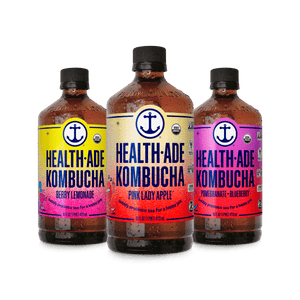
Kombucha | 12 Pack
Fan Favorite Variety Pack
One-time Purchase
49.95

Copied URL to clipboard!
WATER + YOUR HEALTH:
Did you know that you're made up of almost 70% water? Did you also know that we can go weeks without food but can't go 1 week without water? No question - drinking plenty of water is essential for human health. Read on for a break down of it all…
Several studies show that water does a whole lot of good for our bodies. From hydrating skin and regulating body temperature, to keeping kidney stones at bay and maintaining blood pressure, water plays a key role in things we care about.
Unfortunately, it's estimated that around 75% of us are dehydrated, which might explain our headaches, chronic fatigue, and even anxiety. Our bodies rely on our water balance quite a bit, and negative impacts can start as soon as we're a mere 1-2% off from our optimal intake. Did you know an intense workout can throw us off a whopping 6-10%? It surprised me to learn that optimal balance can so easily fall off track…The good news is, when we do come up short, it's pretty easy to get more water in our systems (BRB going to chug some now!)
Did you know water is good for the gut, too?
When it comes to digestion, it's no surprise water plays a big role. For decades, the #1 recommendation for treating constipation has been to drink more water, similar to IBS.
It looks like water could be driving our microbiome makeup as well: Recently, one study looked into water's impact on our gut microbes. The key takeaway? Indulging in 8 cups of water per day was linked to having a healthy & abundant microbiome, which we know has a halo effect on many other aspects of our overall health. Similarly, those who consumed less than 4 cups of water a day had a significantly less healthy & abundant microbiome. All this suggests that water intake could be a key differentiator to our gut health. To take it a step further, this same study suggests that those who drink pure mineral or well water have a more abundant microbiome compared to those who drink tap, bottled, or filtered water.
While more studies need to be completed to confirm all this, the science looks pretty promising that a healthy gut is a hydrated one.
How much should you drink?
Hot hydration topic! Currently, the recommended amount is about 8 cups per day. But recent studies suggest that's not enough, and that the right amount for most of us is likely closer to 11-12 cups per day. Meanwhile, many fitness instructors and nutritionists rave about the effects of drinking 1 gallon a day (16 cups), but these haven't been validated or sufficiently studied yet.
There are also some populations who should talk to their doctor about drinking more water, as issues with pulmonary disease and certain renal diseases can get worse with increased liquid in the system.
Is it JUST water that's hydrating?
There are a lot of people and philosophies out there claiming that warm water is better than cold, still is better than sparkling, and caffeinated beverages are straight-up dehydrating. However, when you look at the research they're not really backed by science. While there haven't been a ton of strong studies done on the hydrating effect of different beverages, those that do exist show most beverages are similar to water in terms of hydration, with the exception of milk, alcohol, or something ultra-caffeinated (2-3 cups of coffee or anything exceeding 250mg+). So according to the research, I'd say almost all of it counts as water, including kombucha!
That said, if you suffer from IBS, acid-reflux, or indigestion, it may be good to limit your carbonated liquids. Even if you're hydrating, studies show symptoms correlated with those conditions often get worse with carbonated sodas and sparkling waters.
What about eating your water?
It is estimated that we get a good 20% of our water intake from food, so the concept of eating your water has credibility. However, all the nutritional recommendations already took this into account. So, if you're planning on “upping” your water intake through food, you'd need to increase the ultra-hydrating foods you're already eating or replace other foods with them. Also, it's pretty hard to track your water intake through food, especially if you're cooking it. This is why I like to think of hydrating foods as a “bonus.” Here are some foods I'd call ultra-hydrating because they have greater than 90% of water when uncooked: Cucumber, Zucchini, watermelon (and melons in general), celery, radishes and broccoli.
Putting it all together!
Even though it's vital for life, most of us don't get enough water. After all, life is busy and sometimes you just forget your water bottle. Here are some tips to keep you focused where it counts: